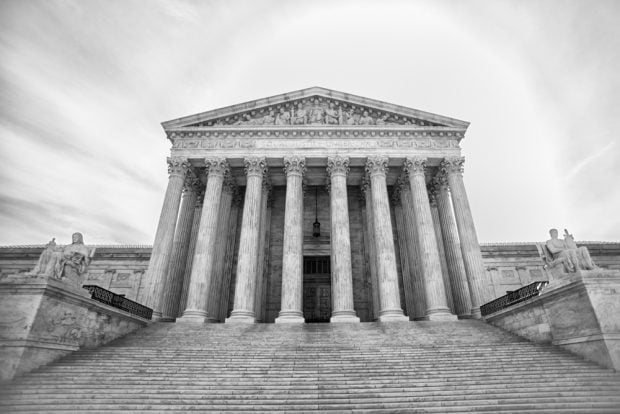 U.S. Supreme Court. Credit/Shutterstock
U.S. Supreme Court. Credit/Shutterstock
CUNA and NAFCU filed a joint brief in the U.S. Supreme Court Monday supporting an issue raised by payday lenders that would force Congress to abandon the CFPB's independent funding if the agency is to survive.
The brief, which also included the National Association of Credit Union Leagues, supports the payday lenders' argument that Congress violated the Constitution when it passed the law in 2010 that created independent funding for the CFPB.
Recommended For You
Congress also established independent funding for other federal agencies, including the FDIC, NCUA and Federal Reserve. But the payday lenders said the CFPB was uniquely unconstitutional because its funding comes through the Federal Reserve, making it "double insulated" from Congress. Because of that violation of the constitution, it argued the payday lending rule was invalid.
The Fifth Circuit Court of Appeals agreed, and the CFPB asked the Supreme Court to review its decision. The Supreme Court agreed to take up the case and set Monday as the deadline for friend-of-the-court briefs. It is expected to hear oral arguments this fall and render a decision later.
Also arguing in support of the payday lenders is the U.S. Chamber of Commerce, the American Bankers Association and John Eastman, a lawyer who is defending himself from a disbarment hearing in California focused on his role in developing a legal strategy to help President Donald Trump stay in power after his 2020 election loss.
The Self Help credit unions and their policy arm, the Center for Responsible Lending, filed a brief in May supporting the CFPB.
Mike Calhoun, president of the Center for Responsible Lending, has said placing the CFPB under direct congressional appropriations has been the main weapon of CFPB opponents. He said an annual appropriation would subject the agency to riders that could restrict or prohibit enforcement of rules to the extent it no longer functions.
Monday's briefs from the credit union trade groups, the bankers and the payday lenders asked the court to allow Congress a limited time to enact a new law that would fix the constitutional deficiencies they see. The CUNA-NAFCU brief recommended three to six months.
CUNA and NAFCU have already endorsed a bill offered by Republicans that would strip the CFPB of its independent funding and governance.
Ann Petros, NAFCU's vice president of regulatory affairs, said that if the Supreme Court accepts the Fifth Circuit's ruling, it would only invalidate the payday lending rule.
Petros also said she assumes the court will accept the "double insulation" doctrine as a necessary requirement for an independent agency to be deemed in violation of the Constitution's appropriations clause. If it does, that might help protect the NCUA and other independent agencies from being deemed unconstitutional.
"The CFPB's structure is unique among financial regulators," Petros said. "It's very, very different than the NCUA, which is supported by a bipartisan board."
© Touchpoint Markets, All Rights Reserved. Request academic re-use from www.copyright.com. All other uses, submit a request to [email protected]. For more inforrmation visit Asset & Logo Licensing.







